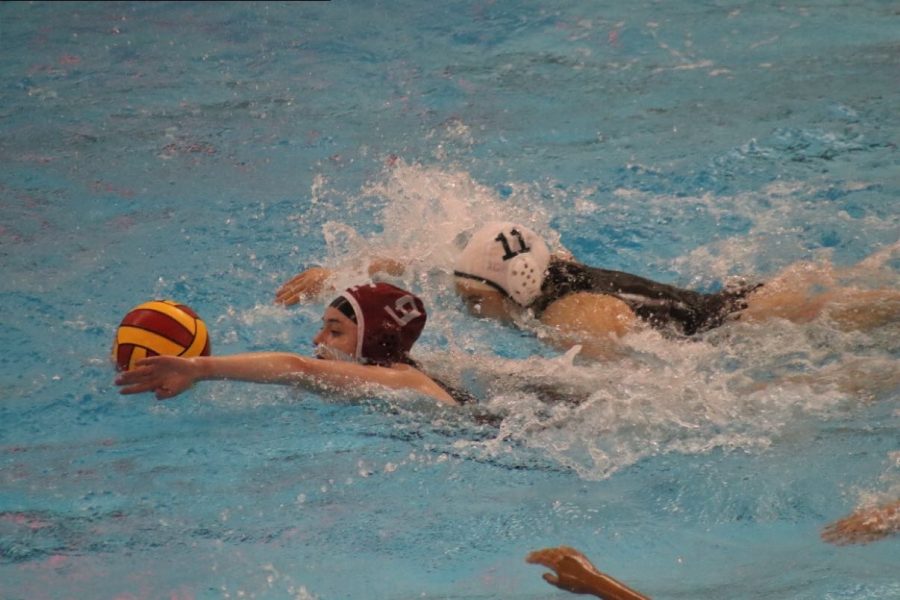The Effects of Excessive Parental Pressure on Young Athletes
Several Underlying Long Term Mental Health Issues Stem from Youth Sports
Lindsay Machado, a senior captain on the Phillips Exeter Academy Water Polo Team, overcame performance anxiety from her youth years.
A sixth grade basketball player slouches on the sidelines of her first playoff game of the season, sipping water with trembling hands. The eighth grade boys team shuffles by on the court in front of her, scoring another basket and securing the win. Worries take over her body as she stares into space, entirely unsure why everything feels so off. Her head spins and vision blurs, and she is deafened by her teammate directly next to her asking if she’s okay. Suddenly her head is laying flat on the red, rubber floor and in confusion she wakes up surrounded by parents echoing her name. “Can she hear us?… Her pulse is pretty fast… Do we call 911?”
A fine line stands between parental support and pushiness when it comes to youth sports. At each soccer game you’ll find a mom juggling containers of orange slices and juice boxes, just happy their kid is participating, but there is also the dad who stares angrily at the field, constantly wishing their young athlete would defend better or score more goals.
Maeve Heffernan is a senior at Triton and has participated in several sports at Triton, including basketball. Her parents showed her support through the years of both youth and high school sports, pushing her to become a better athlete without using excessive pressure or unhealthy mechanisms.
“It was a lot of pressure and stress lifted off me when I knew they’d never be disappointed,” said Heffernan. “If anything, I played better because there was no pressure to be perfect. When your parents constantly encourage and motivate you, it just makes you push to be a better athlete”
A common phenomenon that young athletes experience is performance anxiety. Kids often start feeling pre-game pressure moving into more competitive levels of a sport. According to an article from VeryWellFamily, titled “Performance Anxiety in Children’s Sports,” many children who go through this often have trouble connecting their anxious feelings to their performance in sports. In the pre-teen years, many do not even know what anxiety is or lack understanding it, left feeling scared and alone when they feel anxious.
Lindsay Machado is a senior at Phillips Exeter Academy in Exeter, NH. She plays water polo and is on both the cross country and swim teams there. A highly competitive swimmer from a very young age, Machado discovered she had been hit hard by performance anxiety.
“My first memory of performance anxiety is at ten years old, when I had started racing as a competitive swimmer,” said Machado. “I was overwhelmed by the pressure to make a certain cut time, usually that I had set for myself, and the thought of failing to accomplish that goal was unbearable. I wouldn’t be able to finish races due to hyperventilation.”
“To overcome performance anxiety, I first had to acknowledge it was real, and not just pre-race nerves that everyone felt,” said Machado.
Joseph Colbert, the head Cross Country and Track & Field coach at Triton does not see much parental pressure in running, as parents don’t know a lot about the sport when their child signs up. He often teaches parents about running and the aspects of it. As a parent, he sees parents put a lot of pressure on their kids in sports such as soccer.
“Some parents live vicariously through their children,” said Colbert. “They get a real thrill when their kids are doing well. They think that reflects on them.”
Many parents choose to put their children in sports at a young age to expose them to physical activity, social interaction, and simply to have fun, as well as a foundation for a healthy, active lifestyle. Most of these parents have good, pure intentions, wanting the best for their child through offering them opportunities to succeed. Opposingly, there are parents who lose sight of it being ‘just a game’. From a young age, they put pressure on their children and lose perspective completely. This perspective becomes unhealthy, constantly expressing how to win and develop talent that will increases the possibilities of awards or scholarships. They often raise the amount of money, time, and effort they spend on their child’s sports just so that they are the best one on the playing field.
“Some parents have unrealistic expectations that their kids are going to get college scholarships,” said Colbert. “That I’ve seen a lot of around here.”
There is often a domino effect that falls with this perspective, getting to the point where parents will emphasize winning and pushing skills development over all other aspects of their child’s life, forgetting about school, their friendships, or other activities they participate in or want to be involved with.
When a parent emphasizes athletic development first and their total development second, the child may begin to feel pressure to perform for their parent instead of for themself, going into every competition solely worrying about performing perfectly so their parent reacts positively. It is important for a parent to not change how they interact with their child based on their performances, including being happy for them after wins and being there for them after losses.
Another direct effect of parents losing perspective includes a negatively impacted parent-child relationship. According to an article from PsychologyToday, titled “Parental Pressure Takes a Toll on Young Athletes,” arguments about how a child is training or competing can increase and the child may start ignoring their parents and stop listening to advice. Discussions about sports become unwanted, consequently flooding over into relationships outside of sport.
The main warning signs of a parent with a lost healthy perspective of youth sport include restricting social activities, letting education become a distant priority behind talent development, conversations that are almost always discussing sports that review and break down past games, giving excessive feedback on performance, and frequent sports related arguments. Children will become overly nervous about competing, especially with parents watching the game and a child looking into the crowd for approval.
“As a parent I’ll be at games and you see parents putting a ton of pressure on their kids,” said Colbert. “I see it around here.”
When enrolling children in sports, it is important to avoid losing healthy perspective and listen to the child to see if they enjoy the particular sport or not, especially giving them options and having conversations before signing them up. Recognizing that youth sports are meant to develop positive characteristics in children is vital and putting the importance of hard work, leadership, sportsmanship, and team work over the amount of wins and trophies. According to an article from AppliedSportPsych, titled Keeping Perspective in Youth Sport, children that show immense talent right away and have love and passion for the sport should be regulated, not letting the sport take over their physical and mental development as a person. Their sport should not be their job.
The young girl went on to quit each sport she ever participated in, each sport failing with high parental pressure and increased anxiety. She found success and happiness through athletics but the pressure took over and scared her away. It is important to build healthy relationships with sports and parents to avoid this from happening.
“I finally opened up about it to a counselor when I was fifteen, and one of the most impactful things I learned was that I was using my performance in sports as a metric of my worth as a human being,” said Machado. “When I interrogated that mentality, and finally learned to detach one from the other, I was able to begin overcoming that anxiety.”

Hi! My name is Ellie Gay-Killeen and I’m a senior at Triton High School. I was formally a runner on the high school team from eighth grade to junior...


